- Home
- Dave Eggers
Up the Mountain Coming Down Slowly Page 3
Up the Mountain Coming Down Slowly Read online
Page 3
Within minutes she is shaking. It's no more than forty degrees and the rain is harder here; there are no trees diverting its impact. And there are no tents assembled, because they have beaten the porters to the camp. Even Grant seems to see the poor reasoning involved in their strategy. The one thing Grant doesn't have is a tarp, and without it there is no point in pitching his tent on earth this wet. They will have to wait, alone in the rain, until the porters arrive.
"It'll be at least an hour," Grant says.
"Maybe sooner for the porters?" Rita suggests.
"We sure didn't think this one through," he says, then spits a brown stream onto a clean green banana leaf.
Under a shrub no more than four feet tall, offering little protection, they sit together on a horizontal and wet log and let the rain come down on them. Rita tries not to shiver, because shivering is the first step, she remembers, to hypothermia. She slows her breathing, stills her body, and brings her arms from her sleeves and onto her naked skin.
Frank is furious. His eyes are wild. He feels compromised. The paying hikers are all in a cold canvas tent, sitting around a table no bigger than one meant for poker, and they are eating dinner— rice, plain noodles, potatoes, tea, orange slices.
"I know a few of you think you're hotshots," Frank says, blowing into his tea to cool it, "but this is no Cakewalk up here. Today you're a speed demon; tomorrow you're sore and sick, full of blisters and malaria and God knows what."
Grant is looking straight at him, very serious, neither mocking nor confronting.
"Or you get an aneurysm. There's a reason you have a guide, people. I've been up and down this mountain twelve times, and there's a reason for that."
He blows into his tea again. "There's a reason for that, you . . . people."
He shakes his head as if suddenly chilled. "I need to know you're gonna act like adults, not like . . . yahoos!" And with that he burrows his thumb and forefinger into his eye sockets, a man with too much on his mind.
The food before the group has ostensibly been cooked, by the porters, but within the time it took to carry it from the tent where it was heated to this, their makeshift dining tent, the food has gone cold, as cold as if it had been refrigerated. Everyone eats what they can, though without cheer. The day was long and each hiker has an injury, or an issue of some sort. Mike's stomach is already feeling wrong, and at some point Shelly slipped and cut her hand open on a sharp stick. Jerry is having the first twinges of an altitude headache. Only Rita and Grant are, for the time being, problem-free. Rita makes the mistake of announcing this, and it seems only to get Frank angrier.
"Well, it'll happen sooner or later, ma'am. Something will. You're probably better off being sick now, because in a few days, it'll hit you harder and deeper. So pray to get sick tonight, you two."
"You sit over there, you'll get dead," Jerry says, pointing to a corner of the tent where a hole is allowing a drizzle to pour onto the floor. "What kinda equipment you providing here anyway, Frank?" Jerry's tone is gregarious, but the message is plain.
"Are you dry?" Frank asks. Jerry nods. "Then you're fine."
They're sitting on small canvas folding stools, and the paying hikers have to hunch over to eat; there is no room for elbows. When they first sat down they had passed around and used the clear hand-sanitizing fluid provided—like soft soap but cool and stinging lightly. Rita had rubbed her hands and tried to clear the dirt from her palms, but afterward found her hands no cleaner. She looks at her palms now, after two applications of the sanitizer, and though they're dry their every crevice is brown.
The man who brought the platters of rice and potatoes— Steven—pokes his head into the tent again, his smile preceding him. He's in a purple fleece pullover with a matching stocking cap. He announces the coming of soup and everyone cheers. Soon there is soup finally and everyone devours the soup. The heat of the bodies of the paying hikers slowly warms the canvas tent and the candles on the table create the appearance of comfort. But they know that outside this tent the air is approaching freezing, and in the arc of night will dip below.
"Why are there no campfires?"
It's the first thing Mike has said at dinner.
"Honey collectors," Frank says. "Burned half the mountain."
Mike looks confused.
"They try to smoke out the bees to get the honey," Frank explains, "but it gets out of control. That's the theory anyway. Might have been a lot of things, but the mountain burned and now they won't allow fires."
"Also the firewood," Patrick says.
"Right, right," Frank says, nodding into his soup. "The porters were cutting down the trees for firewood. They were supposed to bring the firewood from below, but then they'd run out and start cutting whatever was handy. You're right, Patrick. I forgot about that. Now they're not even allowed to have firewood on the mountain. Illegal."
"So how do clothes get dry?" This from Jerry, who in the candlelight looks younger, and, Rita suddenly thinks, like a man who would be cast in a soap opera, as the patriarch of a powerful family. His hair is white and full, straight and smooth, riding away from his forehead like the back of a cresting wave.
"If there's sun tomorrow, they get dry," Frank says. "If there's no sun, they stay wet," he says, then sits back and waits for someone to complain. No one does, so he softens. "Put the wet clothes in your sleeping bag. Somewhere where you don't have to feel 'em. The heat in there will dry 'em out, usually. Otherwise work around the wet clothes till we get some sun."
"This is why those porters dropped out," Jerry says, with certainty.
"Listen," Frank says, "porters drop out all the time. Some of them are superstitious. Some just don't like rain. Doesn't mean a thing. We'll be fine."
Rita cannot get a grip on how this will work. She doesn't see how they can continue up the mountain, facing more rain, as it also becomes colder, the air thinner, and without their having any chance of drying the clothes that are surely too wet to wear. Is this not how people get sick or die? By getting wet and cold and staying wet and cold? Her concern, though, is a dull and almost distant one, because almost immediately after the plates are taken away, she feels exhausted beyond all measure. Her vision is blurry and her limbs tingle.
"I guess we're bunking together," Shelly says, suddenly behind her, above her. Everyone is standing up. Rita rises and follows Shelly outside, where it is still drizzling the coldest rain. The hikers all say good night, Mike and Jerry heading toward the toilet tent, just assembled—a triangular structure, three poles with a tarp wrapped around, a zipper for entry and a three-foot hole dug below. Father and son are each carrying a small roll of toilet paper, protecting it from the rain with their plastic baggies containing their toothbrushes and paste. Their silhouettes are smudges scratched by the gray lines of the cold rain.
Shelly and Rita's tent is small and quickly becomes warm. Inside they crawl around, arranging their things, using their headlamps—a pair of miners looking for a lost contact lens.
"One day down," Shelly says.
Rita grunts her assent.
"Not much fun so far," Shelly says.
"No, not yet."
"But it's not supposed to be, I suppose. The point is getting up, right?"
"I guess."
"At all costs, right?"
"Right," Rita says, though she has no idea what Shelly is talking about.
Shelly soon settles into her sleeping bag, and turns toward Rita, closing her eyes. Shelly is asleep in seconds, and her breathing is loud. She breathes in through her nose and out through her nose, the exhalations in quick effortful bursts. Shelly is a yoga person and while Rita thought this was interesting an hour ago, now she hates yoga and everyone who might foster its dissemination. Yoga people are loud breathers and loud breathers are selfish and wicked.
The rain continues, tattering all night, almost rhythmic but not rhythmic enough, and Rita is awake for an hour, listening to Shelly's breathing and the rain, which comes in bursts, as if deposit
ed by planes sweeping overhead. She cannot help but concentrate on Shelly's breathing. She worries that she will never sleep, and that she will be too tired tomorrow, that this will weaken her system and she will succumb to the cerebral edema that is ready, she knows, to leap. She sees the aneurysrn in the form of a huge red troll, like a Kewpie doll, the hair aflame, though with a pair of enormous scissors, like those used to open malls and car dealerships—that the troll will jump from the mountain and with its great circus scissors, sever Rita's medulla oblongata and her ties to this world.
Gwen is to blame. Gwen had wanted, she guesses, to help Rita do something great. Gwen had been ruthlessly supportive for decades now, sending money, making phone calls on her behalf, setting Rita up with job interviews and divorced men who on the first date wanted to hold hands after an Olive Garden dinner. Their hands were rough and fat always, and Rita wanted no more of Gwen's help. Rita loved Gwen in an objective way, in an admiring way totally separate from her obligations to sibling affection. Gwen was so tall, so narrow, could not wear heels without looking like some kind of heron in black leggings, but her laugh was round and rolling, and it came out of her, as everything did, with its arms wide and embracing. She could be president if she'd wanted that job, but she hadn't—she'd chosen instead to torment Rita with her thoughtfulness. Baskets of cheese, thank you notes, that long weekend in Puerto Vallarta when they'd rented the convertible Beetle. She even bought Rita a new mailbox and installed it, with cement and a shovel, when it was stolen in the night. This is what Gwen did, this and humor Brad, and await her baby, and run a small business, as fruitful as she could hope, that provided closet reorganization plans to very wealthy people in Santa Fe.
Rita knows she can't ask Shelly to share her sleeping bag but she wants a body close to her. She hasn't slept well since J.J. and Frederick went away because she has not been warm. No one ever said so but they didn't think it appropriate that the kids slept in her bed. Gwen had found it odd when Rita had bought a larger bed, but Rita knew that having those two bodies near her, never touching anywhere but a calf or ankle, her body calming their fears, was the only indispensible experience of her life or anyone else's.
As her heart blinks rapidly, Rita promises herself that the next day will be less punishing, less severe. The morning will be clear and dry and when the fog burns off, it will be so warm, maybe even hot, with the sun coming all over and drying their wet things. They will walk upward in the morning wearing shorts and sunglasses, upward toward the sun.
The morning is wet and foggy and there is no sun and everything that was wet the night before is now wetter. Rita's mood is a slashing despair; she does not want to leave her sleeping bag or her tent, she wants all these filthy people gone, and wants her things dry and clean. She wants to be alone, for a few minutes at least. She knows she can't, because outside the tent are the other hikers, and there are twenty porters, and now, a small group of German hikers, and at the far side of the camp, three Canadians and a crew of twelve—they must have arrived after dark. Everyone is waking up. She hears the pouring of water, the rattle of pots, the thrufting of tents. Rita is so tired and so awake and she comes close to crying. She wants to be in this sleeping bag, not awake but still sleeping, for two and a half hours more. In two and a half hours she could regather her strength, all of it. She would have a running start at this day, and could then leap past anyone.
There is conversation from the next tent. The voices are not whispering, not even attempting to whisper.
"You're kidding me," one voice says. "You know how much we paid for these tickets? How long did we plan to come here, how long did I save?"
It's Jerry.
"You know you didn't have to save, Dad."
"But Michael. We planned this for years. I talked to you about this when you were ten. Remember? When Uncle Mark came back? Christ!"
"Dad, I just—"
"And here you're going down after one freaking day!"
"Listen. I have never felt so weak, Dad. It's just so much harder than—"
"Michael. Yesterday was the hardest day—the rest will be nothing. You heard what's-his-face . . . Frank. This was the hard one. I can see why you're a little concerned, but you gotta buck up now, son. Yesterday was bad but—"
"Shhh."
"No one can hear us, Michael. For heaven's sake. Everyone's asleep."
"Shh!"
"I will not have you shushing me! And I won't have you—"
There is the sound of a sleeping bag being adjusted, and then the voices become lower and softer.
"I will not have you leaving this—"
And the voice dips below audibility.
Shelly is awake now, too. She has been listening, and gives Rita a raised eyebrow. Rita reciprocates, and begins searching through her duffel bag for what to wear today. She has brought three pairs of pants, two shorts, five shirts, two fleece sweatshirts, and her parka. Putting on her socks, wool and shaped like her foot, the ankle area reinforced and double-lined, she wonders if Mike will actually be going down so soon. There is a spare garbage bag into which she shoves her dirty socks, yesterday's shirt, and her jogging bra, which she can smell—rain and trees and her.
"You'd have to break my leg," Shelly whispers. She is still in her sleeping bag, only her face visible. Rita suddenly thinks she looks like someone. An actress. Jill Clayburgh. Jane Curtin? Kathleen Turner.
"Break my leg and cut my tendons. You'd have to. I'm doing this climb."
Rita nods and heads toward the tent's door flap.
"If you're going outside," Shelly says, "give me a weather report."
Rita pokes her head through the flaps and is facing fifteen porters.
They are all standing in the fog, just across the campsite, under the drizzle, some holding cups, all in the clothes they were wearing yesterday. They are outside the cooking tent, and they are all staring at her face through the flap. She quickly pulls it back into the tent.
"What's it like?" Shelly asks.
"Same," Rita says.
Breakfast is porridge and tea and orange slices that have been left in the open air too long and are now dry, almost brown. There is toast, cold and hard and with hard butter needing to be applied with great force. Again the five paying hikers are hunched over the small card table, and they eat everything they can. They pass the brown sugar and dump it into their porridge, and they pass the milk for their coffee, and they worry that the caffeine will give them the runs and they'll have to make excessive trips to the toilet tent, which now everyone dreads. Rita had wondered if the trip might be too soft, too easy, but now, so soon after getting here, she knows that she is somewhere else. It's something very different.
"How was that tent of yours?" Frank asks, directing his chin toward Grant. "Not too warm, eh?"
"It was a little cool, you're right, Frank." Grant is pouring himself a third cup of tea.
"Grant thinks his dad's old canvas army tent was the way to go," Frank says. "But he didn't count on this rain, didja, Grant? Your dad could dry his out next to the fire, but that ain't happening up here, friend."
Grant's hands are clasped in front of him, as if arm-wrestling with himself. He is listening and looking at Frank without any sort of emotion.
"That thing ain't dry tonight, you're gonna be bunking with me or someone else, Grant." Frank is scratching his beard in a way that looks painful. "Otherwise the rain and wind will make an icebox of that tent. You'll freeze in your sleep, and you won't even know it. You'll wake up dead."
The trail winds like a narrow river up through an hour of rain forest, drier today, and then cuts through a hillside cleared by fire.
Everyone is walking together now, the ground is bare and black. There are twisted remnants of trees straining from the soil, their extremities gone but their roots almost intact.
"There's your forest fire," Frank says.
The fog is finally clearing. Though the pace is slow, around a field of round rocks knee-high, it is not as slow as t
he day before, and because Rita is tired and her legs are sore in every place, from ankle to upper thigh, she accepts the reduced speed. Grant is behind her and also seems resigned.
But Mike is far more ill today. The five paying hikers know this because it has become the habit of all to monitor the health of everyone else. The words "How are you?" on this mountain do not form an innocuous or rhetorical question. The words in each case, from each hiker, give way to a distinct and complicated answer, involving the appearance or avoidance of blisters, of burgeoning headaches, of sore ankles and quads, shoulders that still, even with the straps adjusted, feel pinched. Mike's stomach feels, he is telling everyone, like there is actually a large tapeworm inside him. Its movements are trackable, relentless, he claims, and he's given it a name: Ashley, after an ex-girlfriend. He looks desperate for a moment of contentment; he looks like a sick child, lying on the bathroom floor, bent around the toilet, exhausted and defeated, who only wants the vomiting to stop.
Today the porters are passing the paying hikers. Every few minutes another goes by, or a group of them. The porters walk alone or in packs of three. When they come through they do one of two things: If there is room around the hikers, when the path is wide or there is space to walk through the dirt or rocks beside them, they will jog around them; when the path is narrow they will wait for the hikers to step aside.

 A Hologram for the King
A Hologram for the King Heroes of the Frontier
Heroes of the Frontier A Heartbreaking Work of Staggering Genius
A Heartbreaking Work of Staggering Genius The Best American Nonrequired Reading 2013
The Best American Nonrequired Reading 2013 How We Are Hungry
How We Are Hungry The Circle
The Circle What is the What
What is the What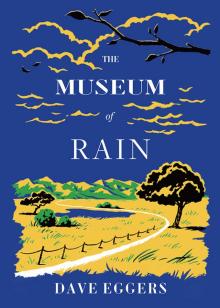 The Museum of Rain
The Museum of Rain The Captain and the Glory
The Captain and the Glory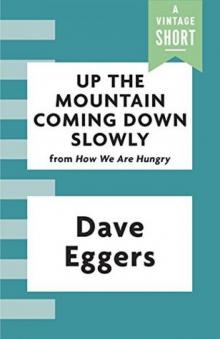 Up the Mountain Coming Down Slowly
Up the Mountain Coming Down Slowly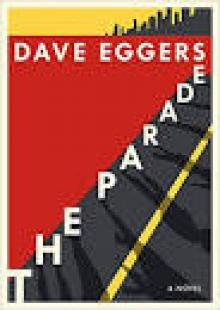 The Parade
The Parade The Monk of Mokha
The Monk of Mokha Your Fathers, Where Are They? And the Prophets, Do They Live Forever?
Your Fathers, Where Are They? And the Prophets, Do They Live Forever? You Shall Know Our Velocity
You Shall Know Our Velocity The Wild Things
The Wild Things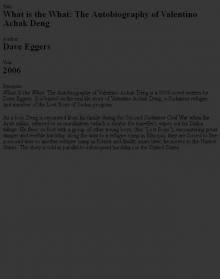 2006 - What is the What
2006 - What is the What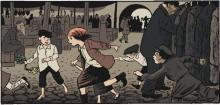 The Best American Nonrequired Reading 2011
The Best American Nonrequired Reading 2011 Created in Darkness by Troubled Americans
Created in Darkness by Troubled Americans